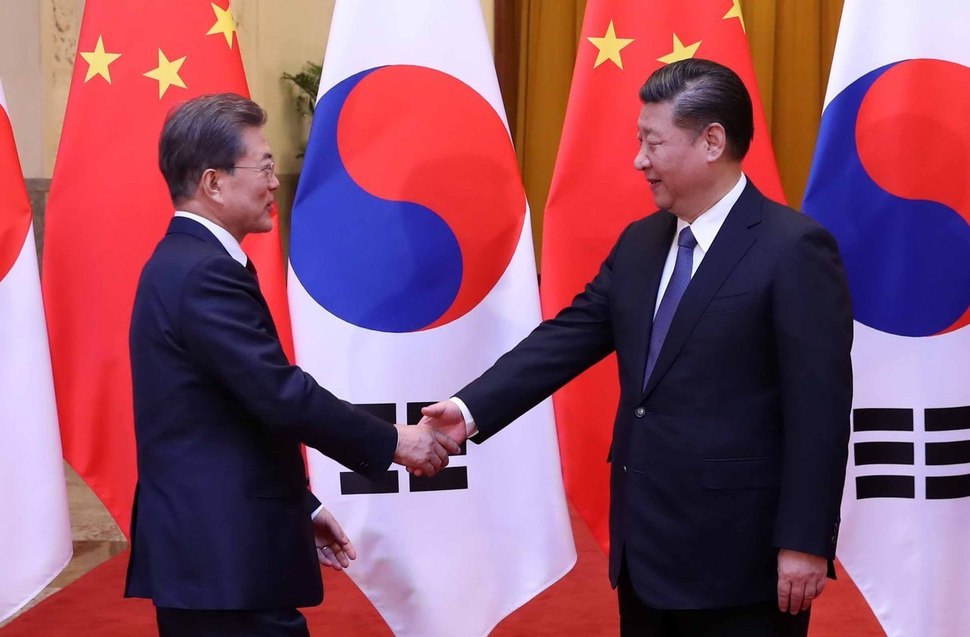 |
|
South Korean President Moon Jae-in shakes hands with Chinese President Xi Jinping prior to their summit on Dec. 14. (Yonhap News)
|
Progress is hailed in areas of restoring trust and improving economic relations
During South Korean President Moon Jae-in’s interview with state-run China Central Television (CCTV), which was conducted on Dec. 8 and broadcast on Dec. 11 prior to his first state visit to China from Dec. 13 to 16, he declared the goals of his visit to be restoring bilateral trust, creating friendly relations, and improving economic cooperation. In pursuit of the goal of normalizing South Korea-China relations after they were damaged by the THAAD conflict that began under the previous administration, analysts believe that Moon achieved significant results, despite allegations from some conservative politicians and news outlets that he was “given the cold shoulder.” During his four-day trip to China, Moon focused on “walking a mile in another’s shoes” and “reflecting on the past to gain insight into the future” as he strove to win over the hearts and minds of China President Xi Jinping and the Chinese public. Prior to his visit to China, Moon read Xi’s speech during the 19th National Congress of the Communist Party of China in its entirety, and he expressed his condolences and sympathy for the victims of the Nanjing Massacre. He visited a working class restaurant in Beijing to make an effort to reach out to the Chinese public. “I think that on this trip the two leaders have completely overcome the awkwardness created by the THAAD dispute. References to THAAD have decreased markedly in terms of their frequency, their intensity and their attribution of blame,” said a senior official at the Blue House on the plane during Moon’s flight back to South Korea on Dec. 16. Through these efforts, Moon succeed at convincing China to end its retaliation for THAAD and to also reconfirm the principle of a “peaceful resolution” in dealing with the North Korean nuclear issue. “We reached an agreement to completely reopen 77 bilateral deliberative channels at the bureau director-general level and above, including the South Korea-China Economic Ministerial Meeting,” Senior Secretary to the President for Public Relations Yoon Young-chan said on Dec. 17. “Resolving the THAAD issue will have the effect of increasing the South Korean economic growth rate by 0.2 percentage points,” Blue House economic advisor Kim Hyun-chul said during an appearance on “11:50 AM at the Blue House,” a live broadcast on Facebook on the same day. The two leaders also agreed to four principles connected with the North Korean nuclear issue, including the complete rejection of war on the Korean Peninsula and achieving a peaceful resolution through dialogue and negotiations. By agreeing that improving inter-Korean relations would ultimately contribute to resolving Korean peninsular issues, Xi also backed up Moon’s attempt to sit in the “driver’s seat” on the Korean Peninsula. But some analysts believe that China deliberately expressed its displeasure about THAAD by having Assistant Foreign Minister Kong Xuanyou greet Moon at the airport and by limiting Moon’s “dining diplomacy” to his state dinner with Xi on Dec. 14 and a luncheon with Chongqing Secretary Chen Min'er on Dec. 16. An assault by Chinese security guards on South Korean photojournalists who were covering Moon – which Blue House Spokesperson Park Soo-hyun described as “something that should never have happened” – also left a blot on the trip. “That indicates just how much dissatisfaction remains in China over THAAD. It reflects the current reality of South Korea-China relations,” said Jung Jae-heung, an analyst at the Sejong Institute. But Blue House officials said they “never thought that the luncheons and dinners were a problem while preparing those events” and do not regard Moon’s reception at the airport as “discourteous in terms of protocol.” “First through our summit with the US in Washington in May and now through this summit with China, we have surmounted major diplomatic obstacles,” one senior official at the Blue House concluded. “China felt uncomfortable with rolling out the red carpet [for Moon] considering that the THAAD issue, which President Xi has defined as a key interest for China, remains unresolved. Even so, it’s clear that this was a turning point in their strained relations. Agreeing to reset economic cooperation with China was an important achievement,” said Kim Heung-gyu, director of the Chinese Policy Research Institute at Ajou University. By Seong Yeon-cheol and Kim Ji-eun, staff reporters Please direct questions or comments to [english@hani.co.kr]






